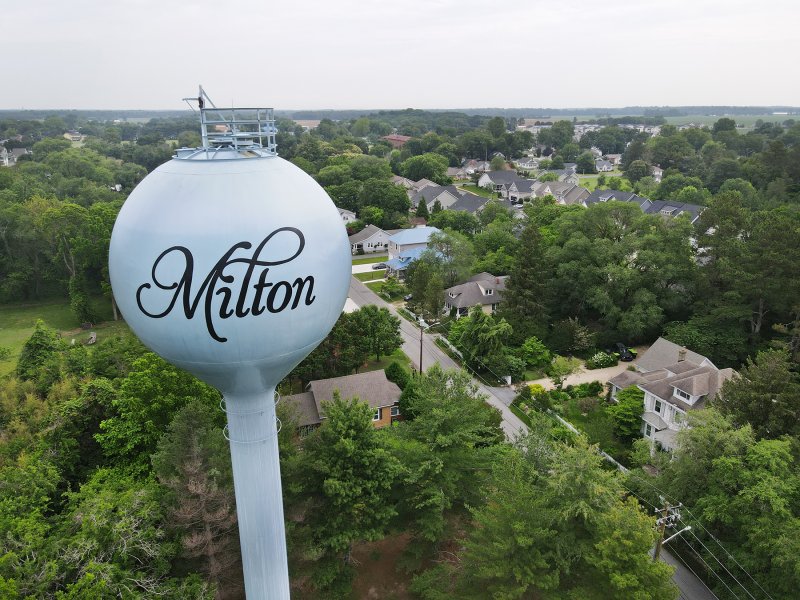Milton takes part in sprawling federal class-action suit
The Town of Milton is one of several Cape Region municipalities taking part in a large-scale class-action lawsuit over remediation of per- and polyfluoroalkyl substances in the water system.
Milton is taking part in four separate federal class-action suits related to PFAS: one against DuPont, one against Tyco Fire Products, one against BASF Corporation and one against 3M. Town Manager Kristy Rogers said the lawsuit against 3M has been settled, with the town in line for payments of $55,000 over 10 years. Rogers said that money will be reserved in the event of future PFAS treatment.
She said, “At this time, Milton is not required to remediate or treat for PFAS. However, as the EPA continues to review and revise regulations, this standard may change.”
Milton elected to join the class-action in August 2024.
The City of Rehoboth Beach is also part of the settlement. Mayor Stan Mills said, “Through annual testing, the City of Rehoboth Beach is aware that PFAS, or forever chemicals, are present in our water supply. That said, it’s important to note that the levels do not exceed current standards. Still, we know that PFAS in drinking water is an environmental and public health issue that needs to be further studied and addressed. The city has developed a strategy for mitigating PFAS levels, which is expected to be implemented through its capital improvement plan over the next three years. Rehoboth Beach joined this class-action suit to help address costs associated with PFAS testing and mitigation. The funding we have received will help as we begin to design the system to implement treatment.”
The Town of Henlopen Acres is also participating in suits against all four companies. Mayor Joni Reich said in July 2024, the town asked its attorney, Glenn Mandalas, to help pursue any damages from PFAS in the town’s drinking water system. Reich said the town found traces of PFAS in two of the town’s 11 wells; the town has stopped drawing water from those wells.
“We will use any recoveries to retrofit our water plant to remove PFAS particles and currently have KCI Technologies on site undertaking a study to determine the best remedial strategy, including new equipment installation. The study is being funded by a $100,000 Emerging Contaminants Grant that we received from the State Office of Drinking Water, with the grant funded by the EPA,” Reich said.
There have been several different class-action suits in recent years related to PFAS contamination, but the suits joined by Milton, Rehoboth and Henlopen Acres were originally filed by the City of Camden, N.J., in 2023. The structure of the litigation allowed for every public water system in the country to join; the case itself is being litigated in the District Court of South Carolina in the courtroom of Judge Richard Gergel.
PFAS refer to a family of chemical compounds that are also referred to as forever chemicals because they do not biodegrade, persist in the environment and can move within groundwater. PFAS can pose health risks in humans. PFAS was developed with the invention of Teflon, and is known for being oil and water repellent. While used a in wide variety of products, for the purposes of the lawsuit, the big use was aqueous film-forming foam, which was used in firefighting foam.
According to the suit against 3M, the company was aware as far back as 1979 that PFAS used near drinking water wells and water supplies contaminated them.
“Nevertheless, defendant elected to develop, manufacture, formulate, distribute, sell, transport, store, load, mix, apply and/or use the defendant's PFAS, thereby placing profits over human health and the environment,” the suit says.
Similar allegations were levied at the other three chemical manufacturers. While 3M has settled, the other three have not yet reached a settlement. If none is reached, a jury trial has been requested.
The class members are asking for damages, remediation costs, costs and expenses of monitoring mechanisms, costs of testing and costs of future treatment, as well as attorney’s fees.
Ryan Mavity covers Milton and the court system. He is married to Rachel Swick Mavity and has two kids, Alex and Jane. Ryan started with the Cape Gazette all the way back in February 2007, previously covering the City of Rehoboth Beach. A native of Easton, Md. and graduate of Towson University, Ryan enjoys watching the Baltimore Ravens, Washington Capitals and Baltimore Orioles in his spare time.






















































